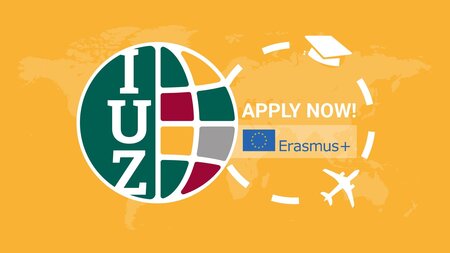Internships abroad
Page contents
General information
An internship abroad offers students excellent opportunities to expand their professional and language skills, to make valuable contacts and to explore interesting job prospects. Furthermore, an internship abroad can serve as an alternative to studying abroad and will be recognised as equivalent to Module 3.1 if you request approval from the Prüfungsausschuss to replace the required Transcript of Records with the Portfolio as part of your Prüfungsleistung (PL). To this end, you need to write a reflective essay and take an oral examination (see below: "When you come back").
If you are interested in doing an internship abroad as an alternative to studying abroad, you can either use your own contacts or make use of existing partnerships. For instance, ERASMUS+ not only supports studies abroad but also internships of between 2 and 12 months abroad. For more information, please visit the IUZ's website on placements abroad and the website of the Leonardo-Büro Sachsen, where you can find receiving institutions for internships abroad.
If you would like to do an internship outside the Erasmus+ funding region, you can consider a PROMOS grant.The programme supports internships abroad lasting between 6 weeks and 6 months, and can also fund studies abroad, theses, language courses,
specialised courses and study trips. For more information about PROMOS, please visit the IUZ website.
In addition, there are several work opportunities in South Asia in school projects, museums and libraries. If you are interested, please get in touch with Prof. Sandten:
- American College/SCILET (Madurai) (library)
- "Stone Bridge Secondary School" in Dhangadhi, Nepal (includes free accommodation and meals)
- Bhasha Research and Publication Center, Vadodara, and the Tribal Academy in Tejgadh, Gujarat, India (museum)
If you would like to study or work at any of these institutions, you can apply for a PROMOS scholarship, which involves financial support for travel and language courses.
Students in teacher training and TESOL can also do a paid internship (at least 5 months) as German-language teachers in schools in various countries (e.g. the Republic of Ireland and the United States) with the Fremdsprachenassistenzprogramm of the PAD (Pädagogischer Austauschdienst).
Furthermore, students in teacher training and TESOL can do a paid internship (10-12 months) as German-language teachers in 150 universities all over the world via the DAAD (Deutscher Akademischer Austauschdienst).
For more information, also feel free to get in touch with any staff members (and Prof. Sandten in particular), who may be able to give you more ideas based on their personal contacts abroad.
The internship should have a minimum duration of 600 hours, and it should also have some relation to your studies (e.g. the frequent use of English; intercultural communication etc.). Please let the going-abroad coordinator ( outgoing.english@…) know what you intend to to once you have found an internship by filling in our downloadable learning agreement.
When you come back
1) Create a portfolio (PL) documenting your stay abroad.
Create a folder containing your downloadable learning agreement, internship certificate or proof of internship letter, and this cover sheet. Most importantly, the portfolio should include a reflective essay (approximately 5 pages, written in English).
In the reflective essay (5–6 pages, in English), reflect on the expectations you had before going abroad, any surprises you encountered during your stay, differences compared to home, and the overall outcome of your time abroad. Consider the impact it has had on your language skills, your outlook on life, and your future plans.
You may wish to consider the following aspects as possible guidelines:
- Introduction: Describe your situation, including where you went, the dates, what you did, and/or what happened.
- Evaluation: Reflect on what was good or bad, easy or difficult, pleasant or unpleasant. Compare and contrast your experiences and explain why certain things may have differed from your expectations.
- Reflection on learning experience: Discuss what you learned during your internship and what insights you gained from living in a foreign city.
- Reflection on the impact of your experience: Explain how what you learned has influenced your future, including any possible connection to your BA topic or career aspirations. What actions do you plan to take as a result of this experience?
- Conclusion: Offer advice to other students planning an internship abroad. What, in hindsight, would you have done differently?
Note: The reflective essay should be written in an academic, formal style but, unlike other academic writing, it should be in the first person perspective and include your personal thoughts and opinions.
2) Take the oral examination (PL).
Submit your reflective essay together with your Learning Agreement to the Sprachpraxis coordinator (Dr. van der Bom) and register for the oral examination by writing her an email. Please use this cover sheet for your submission.
Oral exams usually take place at the end of the Winter Semester or the beginning of the Summer Semester, depending on the submission date. During the 15-minute oral exam, you will be asked questions about your experience abroad based on your portfolio. Ensure that you present your arguments in clear, academic English, highlighting the intercultural, linguistic, and work practice differences you encountered. Support your points with ample evidence and concrete examples.
The focus of the grading for the oral examination will primarily be on your language proficiency.
Frequently Asked Questions (FAQ)
You do not need to submit a letter of motivation for an internship abroad. However, you should inform your coordinator (Dr. Isabelle van der Bom) when and where you will be going.
The internship should have a minimum duration of 600 hours, and it should also have some relation to your studies (e.g. the frequent use of English; intercultural communication etc.).
You can get in touch with the LEONARDO-Büro by visiting their website or sending a email to auslandspraktikum.leosachsen[at]tu-dresden.de.
Yes, please inform your coordinator (either Prof. Dr. Christina Sanchez-Stockhammer or Katharina Scholz) when and where you will be going by filling in a Learning Agreement and by registering for Auslandspraktikum in our accompanying OPAL course for the semester abroad (Modul Auslandssemester).
After you return, please get in touch with the Sprachpraxis coordinator Dr. Isabelle van der Bom to discuss the submission of your portfolio and to schedule a date for the oral exam.
You earn 20 credits for the internship (for a minimum of 600 hours, as 1 credit point equals 30 hours of work). In combination with the portfolio and oral exam upon your return you will achieve the 30 credits necessary for the Module Auslandssemester.




